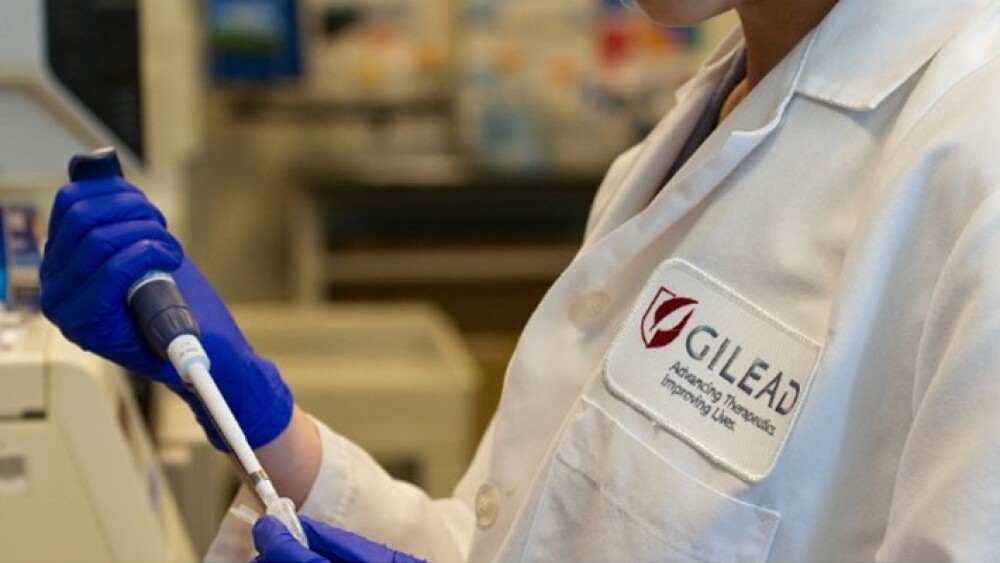February 13, 2017
By Mark Terry, BioSpace.com Breaking News Staff
Speculating on who Gilead Sciences might or should buy is a hobby for many investors and analysts. Mostly the issue is the company’s faltering hepatitis C franchises, caused largely by the dichotomy of selling a drug that cures the disease. But investors really want Gilead to buy something to bolster its bottom line, and although this speculation has been ongoing for a while, there are hints the company might finally be looking to buy. Keith Speights, writing for The Motley Fool, thinks it might be something big.
Recent Woes
The company’s recent financial reporting was not pretty. Speights said it could “inspire a blues song: Falling revenue. Sinking earnings. Horrible outlook for this year.”
Total revenues dropped from $32.639 billion in 2015 to $30.390 billion in 2016. Non-GAAP diluted earnings per share (EPS) dropped from $12.61 in 2015 to $11.57 in 2016. Fourth-quarter earnings dropped 15 percent to $7.3 billion. Spending on research and development increased by 60 percent. In 2016, Gilead’s HCV sales, which includes Sovaldi, Harvoni, and Epclusa, brought in $14.8 billion. Its forecast for 2017 is $9 billion.
The Arguments for an Acquisition
1. In opening remarks at the company’s conference calls, John Milligan, Gilead’s chief executive officer, said the company will focus on “pursuing partnerships or acquisitions that are the right strategic fit” this year. But when he was asked how the company could grow without an acquisition, he sort of dodged the questions, noting that the problems the company is facing with HCV market and loss of patent protection would make it “challenging … to grow without some sort of acquisition.”
2. If Milligan was only hinting, the company’s chief financial officer, Robin Washington, Speights writes, “made some statements that might be key to understanding what the biotech will do next. She hinted that Gilead was already thinking about taking on additional debt to possibly fund an acquisition, that they planned to leverage capital to “pursue external opportunities.”
3. President Trump has indicated he wants to both cut the corporate tax rate and allow for a tax break to repatriate overseas cash. In only three weeks, his administration has been swallowed up by one internal crisis or misstep after another, so it’s hard to say when or even if such a thing would happen. But Washington did note that if it happened, it would “make all that even simpler.” She also said that Gilead was “comfortable that from an asset standpoint that we could support any type of acquisition that we’d need to do to support Gilead’s growth.”
4. Speights points out that Gilead appears to be inferring that it is preparing to spend a lot of cash. He writes, “The company wouldn’t be talking to rating agencies about debt leverage if it wasn’t seriously contemplating borrowing a considerable sum of money.”
Who?
1. Over the last year, the acquisition targets have been broad. Kite Pharmaceuticals , which has a market cap of $2.6 billion, is expected to be the head in the CAR-T immuno-oncology field with KTE-C19. But Speights suspects Gilead is looking for something more transformative.
2. Incyte ’s Jakafi and other immune-oncology pipelines candidates would also be a similar pick, but Incyte wouldn’t be a small deal like Kite—it has a market cap of $23 billion, and Gilead would probably have to cough up around $30 billion to buy it. Speights writes, “Based on Washington’s comments in the call on Tuesday, I wouldn’t be surprised if the company is willing to fork over that amount.”
3. Vertex Pharmaceuticals is another possibility, a break into the rare-disease market. Its market cap is $22 billion.
4. Others occasionally mentioned include Puma Biotechnology , also in the oncology market, with a strong pipeline of drugs in Stage II and III development. Portola Pharmaceutical has been mentioned, with drugs for Factor Xa. Another offered up is Arrowhead Research Corporation , an infectious disease company with a hepatitis B drug in mid-stage pipeline.
Speights writes, “Of course, all of this is speculation for now. But if Gilead really wants to improve its earnings outlook, it’s going to have to spend a lot of money to accomplish that goal. Based on what the biotech’s executives are saying, I think Gilead is ready to open the checkbook.”





